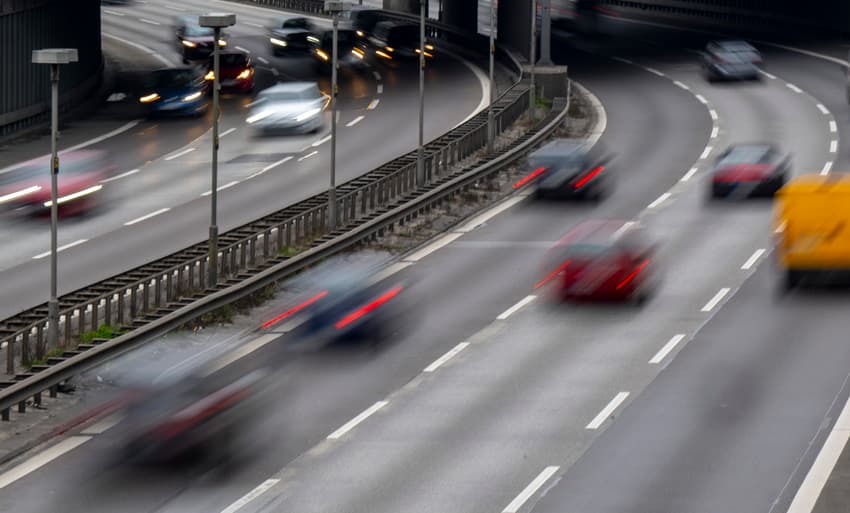Drivers in Germany warned to expect delays on the Autobahn this year

The German government set aside a record amount of money in 2022 to upgrade the country’s highways. But that does mean more than a few headaches for drivers this year.
With a record €5.4 billion investment earmarked last year for Germany’s famous high-speed highway network, the Autobahn is set for a few years of badly needed roadworks, according to road bosses.
“In the past, there was too little invested in maintaining this infrastructure,” Stephan Krenz, head of the federally-owned Autobahn GmbH, told Frankfurter Allgemeine Zeitung (FAZ). “The Autobahn is at its breaking point in many places.”
2023 will see over 550 construction sites set up on the German Autobahn to maintain and upgrade the roads. That covers around 10 percent of the entire network. Contrary to the Autobahn’s reputation for fast, efficient travel – with no speed limit on many stretches – traffic in the affected areas is likely to be prone to long delays.
Krenz says this will probably at least a couple of years. That’s because road crews can only work on about 10 percent of the network at a time without creating serious long-term delays, but a lot more than that portion needs repairs. So crews will work on roughly ten percent of the Autobahn at any given time, setting up new construction sites to replace old ones as they’re completed.
READ ALSO: Eight things you never knew about the German Autobahn
Krenz says bridge works are particularly urgent, with some of them already approaching the end of their lifespan. With around 1,000 bridges needing repaired or even replaced, construction sites to maintain and upgrade them will be set up around the country – in every federal state and including the ring roads around Germany’s three largest cities – Berlin, Hamburg, and Munich.
Krenz says despite climate concerns, road traffic in Germany is only forecasted to go up – particularly when it comes to freight traffic. That’s why creating more rest stops for truckers is another priority, along with infrastructure to charge electric vehicles.
For now though, the majority of work crews are undertaking over the next few years is maintenance, with little new being built on the German Autobahn.
READ ALSO: ‘Germans are not tired of cars’: Number of vehicles on roads continues to rise
Comments
See Also
With a record €5.4 billion investment earmarked last year for Germany’s famous high-speed highway network, the Autobahn is set for a few years of badly needed roadworks, according to road bosses.
“In the past, there was too little invested in maintaining this infrastructure,” Stephan Krenz, head of the federally-owned Autobahn GmbH, told Frankfurter Allgemeine Zeitung (FAZ). “The Autobahn is at its breaking point in many places.”
2023 will see over 550 construction sites set up on the German Autobahn to maintain and upgrade the roads. That covers around 10 percent of the entire network. Contrary to the Autobahn’s reputation for fast, efficient travel – with no speed limit on many stretches – traffic in the affected areas is likely to be prone to long delays.
Krenz says this will probably at least a couple of years. That’s because road crews can only work on about 10 percent of the network at a time without creating serious long-term delays, but a lot more than that portion needs repairs. So crews will work on roughly ten percent of the Autobahn at any given time, setting up new construction sites to replace old ones as they’re completed.
READ ALSO: Eight things you never knew about the German Autobahn
Krenz says bridge works are particularly urgent, with some of them already approaching the end of their lifespan. With around 1,000 bridges needing repaired or even replaced, construction sites to maintain and upgrade them will be set up around the country – in every federal state and including the ring roads around Germany’s three largest cities – Berlin, Hamburg, and Munich.
Krenz says despite climate concerns, road traffic in Germany is only forecasted to go up – particularly when it comes to freight traffic. That’s why creating more rest stops for truckers is another priority, along with infrastructure to charge electric vehicles.
For now though, the majority of work crews are undertaking over the next few years is maintenance, with little new being built on the German Autobahn.
READ ALSO: ‘Germans are not tired of cars’: Number of vehicles on roads continues to rise
Join the conversation in our comments section below. Share your own views and experience and if you have a question or suggestion for our journalists then email us at [email protected].
Please keep comments civil, constructive and on topic – and make sure to read our terms of use before getting involved.
Please log in here to leave a comment.